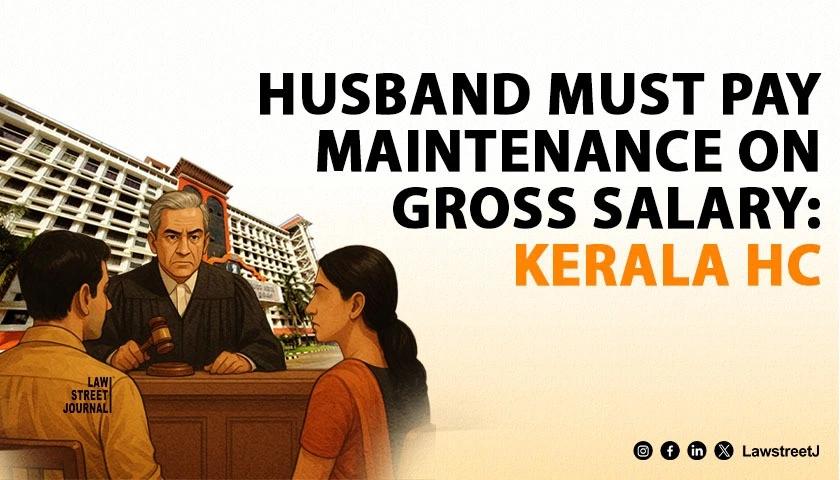Kerala: The Kerala High Court has held that a husband cannot reduce his maintenance liability by availing loans, paying insurance premiums, or increasing contributions towards provident fund and other savings schemes, observing that such tactics to reduce take-home salary are to be deprecated. The Court ruled that the gross income must be considered for calculating maintenance to the wife and children.
Justice A. Badharudeen dismissed a revision petition challenging the grant of ₹6,000/- monthly maintenance to the wife and ₹3,500/- to the minor child, holding that deductions towards loans, LIC premiums, GPF, and other savings cannot be excluded while assessing “sufficient means” under Section 125 CrPC.
The Court addressed RPFC No. 321 of 2025, challenging the judgment dated April 10, 2025, of the Family Court, Kannur in M.C. No. 255 of 2023, which had granted maintenance to the wife and minor daughter.
The wife and child had approached the Family Court asserting that they had no means of livelihood and that the husband, employed as an Instructor at M.E.S. Engineering College, earned ₹50,000/- per month. They claimed ₹15,000/- and ₹5,000/- respectively towards maintenance, including living and educational expenses.
The husband countered the claim, alleging that the wife had an independent source of income and contending that his monthly income was only ₹19,574/- net salary, out of which he required ₹5,000/- for his personal expenses. He also claimed liability towards aged parents and cited his LIC premiums, vehicle loan instalments, and other deductions as grounds to reduce maintenance.
The Family Court noted that, as per Ext. A1 salary certificate, the husband earned ₹21,554/- gross and ₹19,574/- net salary as of February 2024. The husband produced Ext. A3 (LIC premium receipts), Ext. A4 (vehicle loan instalment statement from HDFC Bank), Ext. A5 (account statement), and Ext. A6 (LIC policy certificate).
The Family Court rejected the husband’s contentions, relying on the Kerala High Court’s decision in Surendran K. v. Aswin K.S. [2015 (4) KLT 682], which held:
“What is contemplated under Section 125(1) of the CrPC is ‘sufficient means,’ which refers to the means to maintain one’s wife, children, and parents. For a salaried employee, the ‘means’ includes total earning capacity — that is, the gross income.”
The Court reiterated:
“A salaried employee cannot wriggle out of statutory maintenance liability by availing huge loans and fixing substantial amounts of salary as instalments for repayment. Maintenance cannot be limited to the net salary after deductions like GPF, Group Insurance, LIC premium, State Life Insurance, GPF loan, and other loans.”
Justice Badharudeen emphasized that such deductions are long-term savings:
“All these deductions are long-term savings which the employee will get back with attractive interest at the end of service. Therefore, such deductions cannot be excluded while considering his ‘means’ to pay maintenance. The term ‘means’ includes all the savings also.”
The Court also noted the absence of evidence regarding the wife’s alleged income:
“Though the husband alleged that the wife had her own source of income, neither the nature nor the actual income was disclosed, and no evidence was submitted. Thus, the evidence suggests that the wife and child have no independent income.”
The Court strongly criticized the practice of manipulating deductions:
“Many husbands, when in conflict with their wives and liable to pay maintenance, avail loans, insurance policies, and increase contributions towards GPF and other savings to reduce take-home salary. This tactic is to be deprecated.”
The Court held:
“Such items shall be counted as the net income of the husband to assess reasonable maintenance. Showing amounts as deductions under these heads will not absolve the husband of liability.”
Regarding the obligation under Section 125 CrPC, the Court stated:
“The husband, being the one obliged to maintain his wife and child, cannot wriggle out of liability or seek reduction of maintenance on these grounds.”
The maintenance awarded was found reasonable:
“The amounts granted — ₹6,000/- and ₹3,500/- per month — are very nominal and, in fact, insufficient to meet current needs.”
Accordingly, the Court dismissed the revision petition and directed the husband to clear arrears within thirty days, failing which the wife and child would be free to execute the order.
Adv. Sri Abdul Raoof Pallipath appeared for the revision petitioner, while Advs. Sri M.V. Amaresan and Sri S.S. Aravind appeared for the respondents.
*Case Title: Sumesh A. vs. Babija Balakrishnan M. & Anr.”




![Kerala HC Quashes 498A Dowry Harassment Case Against Live-In Partner, Citing Lack of Relative Status [Read Order]](/secure/uploads/2023/08/lj_5693_1057c042-1e57-4e27-8c9e-25af0ec38ec4.jpg)
![Watching porn on mobile: Kerala HC highlights importance of mother cooked meals, outdoor sports [Read Order]](/secure/uploads/2023/09/lj_9155_Parental_supervision_of_mobile_phone_usage.jpg)
![Lakshadweep MP Mohammed Faizal Disqualified from Lok Sabha After Conviction Suspension Plea Rejected by Kerala High Court [Read Notice]](/secure/uploads/2023/10/lj_9640_87b5fd97-0e05-4ff8-9a99-3be1e4446192.jpg)






